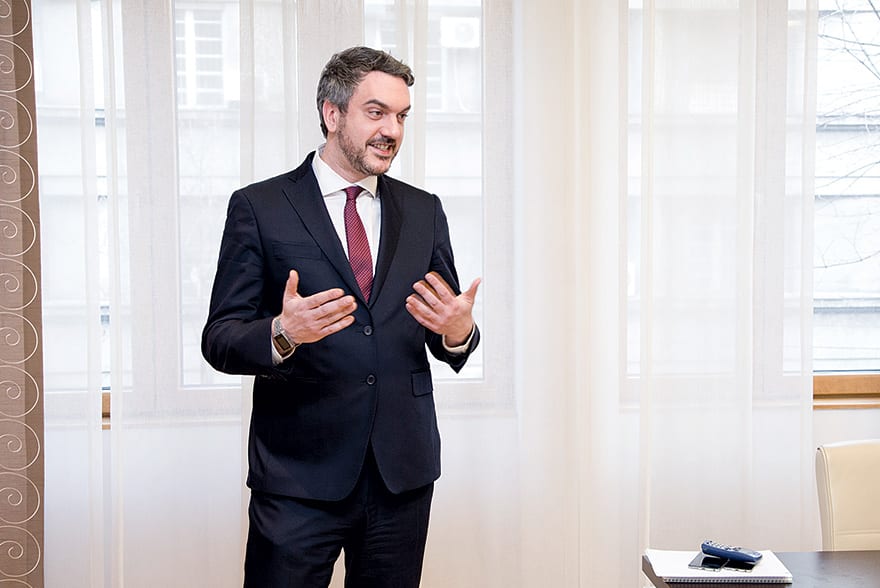Austria has a strong interest in the progress of the economies of the Western Balkans, including Serbia’s, and supports the transformation of domestic industries towards digitalisation and the reform of education in line with market needs. The Chamber of Commerce & Industry of Serbia, as a leader of change in the region, provides a strong contribution to accelerating these trends and establishing best practises
Chamber of Commerce & Industry of Serbia President Marko Čadež, on behalf of the Western Balkans Six Chamber Investment Forum (WB6 CIF), signed a Memorandum of Understanding in Vienna at the beginning of this year on the project to introduce dual education to the Western Balkans and develop the digital economy. “Preparations for the start of the project – to start by the end of the year – are entering their final stages, with the signing of the contract expected in a month or two, and companies from across the entire region can count on the first chamber services for helping in the digitalisation of operations and inclusion in dual education as early as the first half of next year,” says Marko Čadež.
The aim of this four-year project – to be implemented by the WB6 CIF with the financial and expert support of the Austrian Chamber of Commerce (WKO) and the Austrian Development Agency (ADA) – is to strengthen chamber capacities and create a unique set of services for the six Western Balkan chambers for the most effective possible support to the economy in these areas. “In this endeavour, the region will rely on best European practises and Austrian knowhow, with a view to the model of the activities already conducted by the Serbian Chamber of Commerce with the assistance of Austrian partners,” says Čadež.
What kind of specific support and what services can businesses count on?
– In the field of digitalisation, a regional network of previously trained and certified consultants will be established to assist the region’s economy, primarily SMEs, in the digital transformation process – in the devising of digital maps and strategies, and the implementation of technological solutions envisaged by these documents – in the same way that’s already done by the Chamber of Commerce & Industry of Serbia’s Centre for Digital Transformation.
In the dual education segment, we will jointly create – and make available to businessmen throughout the region – a range of important chamber services for the best and most efficient possible involvement of their companies in the dual education of personnel. This implies, among other things, assistance in modernising existing education profiles and creating new ones for the jobs brought by contemporary digital operations. A tangible result of the project will be the establishment of an online regional training academy based on the model of the CCIS Business Academy.
What kind of experience has Serbia had to date in conducting dual education and what jobs are carried out in that process and what kinds of services are provided by the CCIS?
– Serbia was the first country in the region to introduce dual education, through projects with German, Austrian and Swiss partners, was the first to pass a law on dual education in secondary schools, and more recently became the first to legalise the inclusion of this educational model in university colleges. The number of students, schools, companies and dual educational profiles is increasing year on year. In Serbia at present, studies of 35 dual vocations include about 5,500 school pupils – about 3,500 older students, enrolled in previous years, and another 2,600 who began from first grade this year. They attend theoretical classes in 72 secondary schools, and gain practical knowledge and skills through work in around 880 companies, 280 of which opened their doors to students for the first time during this academic year.

The process of accrediting companies is underway, which is one of the chamber’s responsibilities, with the help of companies, in meeting requirements for accreditation. The CCIS provides support to businesspeople in creating or modernising education profiles, including digital profiles, participates equally in the creation of plans for enrolments in schools, organises training for instructors to work with students in enterprises and mediates in establishing cooperation with schools. We recently also established a web platform with complete information, guides and instructions on dual education for companies and pupils. Through this platform, companies will be able to apply for instructor training, accreditations and statements of intent.
With the financial and expert support of the Austrian Chamber of Commerce (WKO) and the Austrian Development Agency (ADA), the economies of the region will work on the introduction of dual education and digitalisation
Ever more companies have been coming to Serbia in recent times, including Austrian companies, that are interested in locating their R&D departments here. However, the experiences of individual companies show that there is already a lack of an available, high-quality workforce. Can Serbia intervene on this issue within a reasonable time frame?
– The fact is that foreign companies that operate here are very satisfied with the quality of personnel, especially highly skilled staff – their qualifications and academic education. This is one of the key arguments for companies from around the world when deciding to open their R&D centres in Serbia. An additional motive is provided by the tax incentive package for investments in innovation, research and development. However, Serbia, like Europe as a whole, is already facing the problem of a shortage of staff in some areas where demand is growing, such as IT, in which Serbia has top experts and products used around the world.
The state’s first response to this potentially much larger problem is to increase enrolment quotas in colleges that educate IT professionals, but also to increase the number of specialised IT departments in high schools. Classes in these departments are already being attended by around 800 pupils, who gain significantly better competencies in computer science and informatics, and are able to gain employment immediately after completing high school. This is simultaneously also a good base for future high-quality students of the IT departments of various colleges.
Are Serbian companies ready to engage in digitalisation and to be partners of Austrian companies, considering that the results of research show that capacities and interest in shifting to digital operations remains relatively modest in the Serbian economy?
– That was a kind of initial picture that we are changing and in which we’ve achieved great progress in the last two years, which Serbia recently received recognition for from German Chancellor Angela Merkel. The activities of the Chamber of Commerce & Industry of Serbia and our Centre for Digital Transformation have contributed significantly to raising awareness about the need for digital transformation and the benefits it brings to companies, as well as to increasing the number of companies digitalising their operations. The Centre is focused on supporting SMEs in digitalising their operations faster and more efficiently – providing information, advice and education, proposing transformation and financing models, supporting the implementation of digital solutions, connecting them with those who possess knowhow, technology, instruments and funds.
With the expert assistance of WKO, the CCIS Centre for Digital Transformation has formed a network of digital consultants in less than two years – with 43 digital transformation consultants trained and certified by WIFI. About a hundred micro, small and medium-sized enterprises have so far received consulting support in the drafting of digital maps and digitalisation strategies, and the first technological solutions envisaged by these documents will be implemented as early as this month.

We’ve raised most chamber services and processes to the electronic level, while we’re developing new digital products, such as the electronic application CCIS instant PAY, online platforms for support in the development of e-commerce in various fields. Together with digitalisation experts from other European chambers, who are gathered in the Eurochambres Committee on Digitalisation, we are working to establish joint digital services that will be available to companies across Europe. At the end of September, Serbia hosted the first Eurochambres Digital Academy, which was enhanced by by the creation of the first Eurochambres joint digital tool, the starting point for which is the DigiPilot project – a French online platform for managing the digital transformation of companies.
By helping our companies to digitalise, we are also strengthening their competitiveness and productivity, as well as their ability to be even more reliable as suppliers and partners to Austrian companies
To what extent did these measures, which relate to education and digitalisation, impact on the overall trade and investment structure of the Austrian economy in Serbia?
– Through Austrian projects to support dual education, and we are also working in cooperation with Austrian companies that already operate here, or those that have taken the decision to invest in Serbia, on developing education profiles based on their needs. Continuing practises from the previous academic year and this one, more than 130 pupils are being schooled for five professions and are gaining practical experience in nine Australian companies operating in Serbia in the fields of trade, transport and construction. We are thereby eliminating one of the constraints on the expanding of their operations, encouraging the faster realisation of planned investments and better export results. Simultaneously, by helping our companies to digitalise, we are also strengthening their competitiveness and productivity, as well as their ability to be even more reliable as suppliers and partners to Austrian companies.
All of this also impacts on strengthening trade and investment cooperation between the two countries, which is recording continuous growth. We ended last year with more than a billion euros in mutual trade, and this year (according to data for the first seven months) that exchange has increased by 21 per cent, with Serbian exports to Austria – to which Austrian companies in Serbia contribute significantly – having increased by 33 per cent, while the deficit has halved compared to the same period of last year. This has contributed to the coverage of imports by exports reaching almost 90 per cent this year. Austria is highly positioned at the top of the list of foreign investors. Investments in the Serbian economy from Austria since 2010 have exceeded two billion euros.